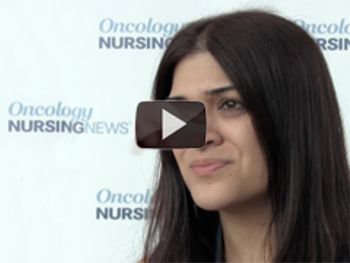
Janet Jones' life changed drastically when she went from oncology nurse to patient with breast cancer.

Janet Jones' life changed drastically when she went from oncology nurse to patient with breast cancer.

A recent study found that weightlifting and resistance training may be a viable option to mitigate the risk and progression of lymphedema.

A recent study reports that there are mary barriers Latina survivors of breast cancer face.

While the breast cancer mortality rate in many nations has declined, this is not true of South Korea and Latin America.

Debu Tripathy on the management of patients with breast cancer on oral oncolytics.

For patients with breast cancer who have undergone breast reconstruction surgery, radiation therapy could increase complications and lower patient-reported satisfaction.

Sam Smith, PhD, from the University of Leeds, discusses strategies to improve adherence that is affected by menopausal symptoms.

A recent study suggests that if a patient with breast cancer shows no signs of cancer prior to adjuvant chemotherapy and no signs of cancer after a sentinel lymph node biopsy (SLNB), an axillary lymph node biopsy (ALNB) could be avoided.

Jame Abraham on the patient experience during scalp cooling for chemotherapy-induced hair loss.

A nurse relates her experience with breast cancer and the added stress of staph infection from a chemotherapy port.

Julie Nangia, MD, gives advice for patients expecting to lose their hair as a result of chemotherapy.

Scalp cooling to reduce, or prevent, chemotherapy-induced hair loss has not been utilized as frequently in the US as elsewhere around the world.

A recent study indicates that having a strong social network could improve survival of patients with breast cancer.

Women experiencing symptoms of menopause are less likely to adhere to treatment.

According to a recent study, postmenopausal women with early-stage breast cancer may be at risk of cardiovascular disease from aromatase inhibitor therapy.

Modern scalp-cooling system is safe and effective in reducing hair loss in women being treated with chemotherapy for their breast cancer, especially for those on taxane-based regimens.

According to findings from a phase II trial, prophylactic treatment with a combination of loperamide and budesonide reduced the rate of all-grade diarrhea associated with neratinib to 65%, compared with 95.4% observed in the ExteNET trial.

According to phase II trial findings, adding everolimus to fulvestrant significantly improved progression-free survival for postmenopausal patients with metastatic hormone receptor-positive, HER2-negative breast cancer who are resistant to aromatase inhibitor therapy.

SHARE's video series featuring women with metastatic breast cancer.

SHARE online support communities for patients with ovarian cancer, breast cancer, and metastatic breast cancer.

Krista Qualmann discusses the nurse's role once a patient has gone for genetic testing.

Kathy LaTour shares her holiday experience with cancer and the tips she's learned since.

Recent research highlights the unmet psychological needs for older breast cancer survivors.

Vitamin D in women with breast cancer has been linked to a better prognosis, especially for women who are premenopausal.

Expert Kristin Zorn, MD discusses the importance that genetics plays in oncology, and the why genetic counseling and testing are vital.